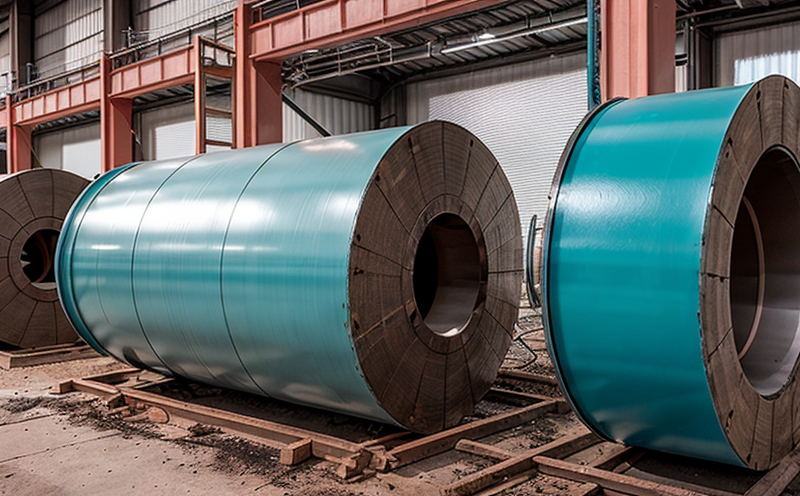ISO 2810 Accelerated Weathering Durability Testing
The ISO 2810 standard provides a method for determining the resistance of materials to outdoor exposure conditions. This accelerated weathering test is crucial in industrial manufacturing and processing, particularly where durability under environmental stressors like ultraviolet (UV) light, rain, humidity, temperature changes, and pollution are critical considerations.
The process involves exposing specimens to artificial sunlight or UV lamps combined with water spray, simulating the effects of natural weathering over time. This method allows for the assessment of materials' durability in a controlled environment, providing results that can predict real-world performance. The accelerated nature of this test accelerates the aging process by several orders of magnitude, allowing manufacturers to identify potential weaknesses early in the product development cycle.
For industrial manufacturing and processing applications, understanding how materials perform under exposure conditions is essential for selecting appropriate materials and coatings that enhance durability, reduce maintenance costs, and extend service life. This test plays a pivotal role in ensuring compliance with international standards and specifications relevant to specific industries such as automotive, aerospace, construction, and electronics.
Materials commonly tested using this method include paints, coatings, plastics, rubber products, and various composite materials used in outdoor applications. By simulating the effects of weathering, ISO 2810 helps manufacturers assess the long-term performance of these materials under real-world conditions without requiring extensive field testing.
The test procedure involves preparing specimens according to specified dimensions and surface finish requirements. Specimens are then exposed to a controlled environment that mimics outdoor exposure conditions. The test duration can vary depending on the material being tested, but it typically ranges from 500 hours up to several thousand hours for accelerated aging.
| Test Parameter | Description |
|---|---|
| Specimen Preparation | Dimensions and surface finish according to ISO 2810 specifications. |
| Test Chamber Conditions | UV lamp intensity, temperature, humidity, and water spray cycle. |
| Exposure Duration | Varies based on material type; typically 500-3000 hours. |
| Data Collection | Visual inspection, UV spectrophotometry, color change measurements. |
The test results are reported in terms of the degree of degradation observed on the specimens. These can include changes in color, gloss, adhesion, and other physical properties that indicate material performance under exposure conditions. Compliance with specific standards or customer requirements is also evaluated.
Understanding ISO 2810 testing is essential for quality managers, compliance officers, R&D engineers, and procurement professionals involved in selecting materials for outdoor applications. By leveraging this accelerated weathering method, industries can make informed decisions that enhance product longevity and reliability while minimizing environmental impact.
Why Choose This Test
The ISO 2810 accelerated weathering test is a critical tool in industrial manufacturing and processing. It allows manufacturers to evaluate the durability of materials under various environmental stressors without relying solely on field testing, which can be unpredictable and time-consuming.
By simulating real-world conditions, this test provides valuable insights into how materials will perform over extended periods, helping companies make informed decisions about material selection. This ensures that products meet both performance expectations and regulatory requirements, thus enhancing customer satisfaction and brand reputation.
The test is particularly beneficial for industries where outdoor durability is a key factor in product design and development. For instance, the automotive industry uses this method to ensure that exterior components maintain their appearance and functionality over extended periods. Similarly, the electronics sector utilizes ISO 2810 to assess the longevity of external casings and connectors.
Choosing this test ensures that materials are thoroughly evaluated under controlled conditions, providing a reliable assessment of material performance. This approach not only enhances product quality but also helps in reducing costs associated with premature failures and warranty claims.
Use Cases and Application Examples
The use of ISO 2810 accelerated weathering testing is extensive across various industries, particularly those dealing with outdoor materials. Here are some notable applications:
- Automotive Industry: Testing exterior components such as bumpers and paint finishes.
- Aerospace Sector: Evaluating the durability of external casings and connectors.
- BUILDING AND CONSTRUCTION: Assessing roof coatings, cladding materials, and window frames.
- ELECTRONICS Industry: Ensuring the longevity of external casings and connectors.
Benefits
- Saves time by accelerating the aging process under controlled conditions.
- Reduces costs associated with outdoor exposure testing.
- Provides early identification of material weaknesses for product improvement.
- Ensures compliance with international standards and customer specifications.
- Promotes consistent quality across production batches by standardizing test conditions.
- Reduces the need for extensive field testing, which can be time-consuming and expensive.





